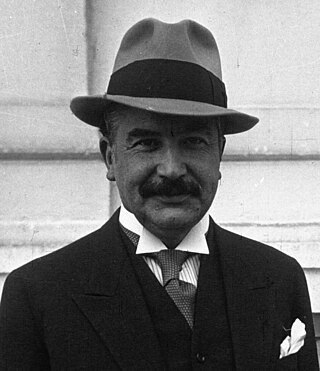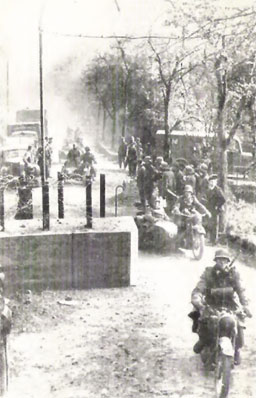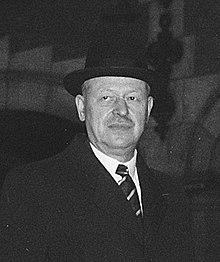After the rejection in the referendum on the Maulkuerfgesetz, Joseph Bech presented his resignation to Grand Duchess Charlotte. [1] However, she initially refused to accept it. [1] In the face of an international situation that was growing more and more menacing, the idea gained ground that a coalition of the three main parties should be formed. [1] But the socialists refused to join a government of which Bech would be a member. [1] The Catholics responded with a similar condition with regards to René Blum, a figure in the Workers' Party. [1] Five months of long negotiations were necessary before Pierre Dupong succeeded in forming a new government coalition, which was almost a national union government. [1] Bech remained in the government, holding on to the Foreign Affairs portfolio. [1] Dupong became head of government. [1] Two socialists joined the government: Pierre Krier, a trade unionist, and René Blum, a lawyer. [1] The liberals were represented in the cabinet by Étienne Schmit. [1] After the latter's death on 19 December 1937, they found no successor who was acceptable to the other parties, and officially withdrew from the coalition on 11 July 1939. [1] For personal reasons, the Workers' Party replaced René Blum with Victor Bodson in April 1940, only a few weeks before the German invasion and the government's departure into exile. [1]
Foreign policy
The remilitarisation of the Rhineland, from 1936, reduced the safety buffer between France and Germany to the small territory of Luxembourg. [2] The presence of foreign troops in the Grand Duchy in case of a Franco-German war once again became a probability. [2] The other Western neighbour of Germany, Belgium, reacted by pulling out from the military agreement with France, and by adopting a "policy of free hands". [2] The Luxembourgish government also sought safety in a policy of neutrality. [2] To consolidate the international position of Luxembourg, the Minister of Foreign Affairs, Joseph Bech, imagined a diplomatic operation: the signatory states to the Treaty of London of 1867 were to reaffirm the perpetual neutrality of Luxembourg by a common declaration. [2] However, Belgium and the United Kingdom equivocated. [2] In the absence of a multilateral agreement, Bech tried to obtain a simultaneous undertaking from France and Germany. [2] While Germany had no problem in expressing towards Luxembourg all the promises that had been requested, France hesitated to commit itself. [2] The French headquarters wanted to retain a right of passage across the Grand Duchy in case of German aggression. [2] Thus, in spring 1939, with the spectre of war hovering over Europe, the government did not succeed in obtaining any formal guarantees. [2] A surprise invasion without a reaction from the other powers became probable. [2]
Domestic policy
In the face of the international threat, the Chamber granted the government an extension of its power in order to allow it to take measures necessary to safeguard the interests of the state. [3] Thus, on the basis of the laws of 28 September 1938 and of 29 August 1939, the government took a series of measures: a new declaration of neutrality, a ban on providing aid to the belligerent parties, increased monitoring of the borders, a ban on hunting in border areas, measures to save fuel and electricity, the creation of stocks of food and fuel, and monitoring of radio broadcasts and the press. [3]
In this context, the commemoration of the centenary of independence, in which the whole of Luxembourgish society participated, became a reaction against the German threat. [3] In 1939, the government skilfully used the commemoration festivities to demonstrate to European public opinion the country's desire for independence. [3] The commemoration succeeded in reconciling Luxembourgish society after it had been divided by the referendum of 1937, and reinforced national sentiments in the face of the external threat. [3]

The Luxembourg Socialist Workers' Party, abbreviated to LSAP or POSL, is a social-democratic, pro-European political party in Luxembourg. The LSAP sits on the centre-left of the political spectrum.

Joseph Bech was a Luxembourgish politician and lawyer. He was the 15th prime minister of Luxembourg, serving for eleven years, from 16 July 1926 to 5 November 1937. He returned to the position after World War II, and served for another four years as the 17th prime minister, from 29 December 1953 until 29 March 1958. The 1982–1983 academic year at the College of Europe was named in his honour.

Pierre Dupong was a Luxembourgish politician and statesman. He was the 16th prime minister of Luxembourg, serving for sixteen years, from 5 November 1937 until his death, on 23 December 1953, and was also responsible at different times for the ministries of finance, the army, agriculture, labour and social matters. He founded the Christian Social People's Party (CSV) as the main conservative party after the Second World War, having been a founding member of the Party of the Right (PD) in 1914.

Victor Nicolas Bodson was a socialist Luxembourgish politician and lawyer who held the posts of Minister of Justice, Public Works, and Transport for long periods of time in the 1940s and 1950s, including in exile during World War II, when Luxembourg was occupied by Nazi Germany.
The National Union Government was a form of national government that governed the Grand Duchy of Luxembourg between 1945 and 13 February 1947, in the direct aftermath of the Second World War. During the war, Luxembourg was invaded, occupied, and annexed by Nazi Germany. Just one of the Luxembourgish casualties of the conflict was the pre-war political system; most of the established parties and alliances disappeared, and some of the leading politicians had lost their lives.
The Party of the Right, abbreviated to PD, was a political party in Luxembourg between 1914 and 1944. It was the direct predecessor of the Christian Social People's Party (CSV), which has ruled Luxembourg for all but fifteen years since.

The Ministry of Foreign Affairs is a ministry of the government of Luxembourg, headquartered in the Bâtiment Mansfeld in Luxembourg City.

The Werner-Cravatte Government was the government of Luxembourg between 15 July 1964 and 6 February 1969. Throughout its term, the Deputy Prime Minister was Henry Cravatte, replacing Eugène Schaus, who had been Deputy Prime Minister in the first Werner-Schaus Government. It was a coalition between the Christian Social People's Party (CSV), and the Luxembourg Socialist Workers' Party (LSAP).
The Frieden Government was the government of Luxembourg between 29 March 1958 and 23 February 1959 until the death of Pierre Frieden. It was a coalition between the Christian Social People's Party (CSV), and the Luxembourg Socialist Workers' Party (LSAP).

The Bech-Bodson Ministry was the government of Luxembourg between 29 December 1953 and 29 March 1958. It was a coalition between the Christian Social People's Party (CSV), and the Luxembourg Socialist Workers' Party (LSAP).

The Dupong-Bodson Ministry was the government of Luxembourg between 3 July 1951 and 23 December 1953. It was a coalition between the Christian Social People's Party (CSV), and the Luxembourg Socialist Workers' Party (LSAP). It was formed after the general election of 1951.
The Dupong-Schaus Ministry was the government of Luxembourg between 1 March 1947 and 3 July 1951. It was a coalition between the Christian Social People's Party (CSV), and the Democratic Group.
The following lists events that happened during 1953 in the Grand Duchy of Luxembourg.

The Luxembourgish government in exile, also known as the Luxembourgish government in London, was the government in exile of Luxembourg during the Second World War. The government was based in London between 1940 and 1944, while Luxembourg was occupied by Nazi Germany. It was led by Pierre Dupong, and also included three other Ministers. The head of state, Grand Duchess Charlotte, also escaped from Luxembourg after the occupation. The government was bipartite, including two members from both the Party of the Right (PD) and the Socialist Workers' Party (LSAP).

The German invasion of Luxembourg was part of Case Yellow, the German invasion of the Low Countries—Belgium, Luxembourg and the Netherlands—and France during World War II. The battle began on 10 May 1940 and lasted just one day. Facing only light resistance, German troops quickly occupied Luxembourg. The Luxembourgish government, and Grand Duchess Charlotte, managed to escape the country and a government-in-exile was created in London.
The Liberation Government was formed on 23 November 1944, when the government in exile came to Luxembourg from London and felt forced to include members of the Unio'n vun den Fraiheetsorgansatiounen, the umbrella group of the Luxembourgish Resistance which had been maintaining order since the liberation by American troops on 10 September 1944, in order to tame its critics.

The Bech Ministry was the government of Luxembourg that came into office in Luxembourg on 16 July 1926 after the resignation of the Prüm Ministry, and was headed by Joseph Bech. It was reshuffled on 11 April 1932 and on 27 December 1936. It stepped down after the referendum on the so-called Maulkuerfgesetz, in which the majority of voters decided against the law.

The Reuter Ministry was the government in office in Luxembourg from 28 September 1918 until 20 March 1925, headed by Émile Reuter. It resulted from the Chamber elections of 28 July and 4 August 1918 and was reshuffled on 5 January 1920 as a result of the elections of 26 October 1919. There was a further reshuffle on 15 April 1921, when the Liberals left the government.
The Maulkuerfgesetz was a proposed 1937 law in Luxembourg. Officially, it was entitled the "Law for the Defence of the Political and Social Order" but was nicknamed Maulkuerfgesetz by its opponents. The law would have allowed the Luxembourgish government to ban the Communist Party and dissolve any political organisation which they believed might endanger the constitutional institutions. The members of these parties or organisations would be stripped of their political offices and could not be employed by the state or by local governments.









